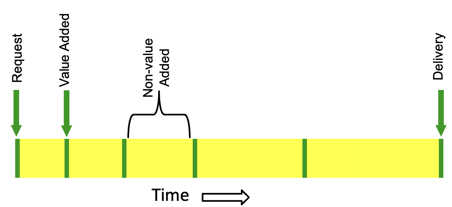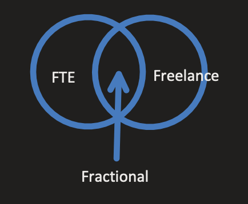I asked the #LinkedInhivemind if there was any data that supports this perceived shift I have been...
Fractional work - what is the world saying?
I must admit, before November 2022 I had not heard (or maybe more likely not registered) of the term "Fractional" applied beyond one vaguely recalled exposure to "Fractional CFO". Clearly, the term did not register as it should have - the more I learn about fractional, the more I'm convinced this is a fundamental change in the nature of work.
Here are two earlier posts that can get you caught up on this topic:
Just as Adam Tooze coined the word "polycrisis" to describe muti-factor independent forces at work in the world today contributing to the economic issues we're all facing. The concept of Fractional work has also been accelerated because of a polycrisis in the foundational nature of work. So many things have changed and are changing the traditional fabric of business:
- Our shared COVID experience we've all been through and a resetting of life priorities and what it means "to work" and "the why" we work.
- The remote-work trend - a shift that has for sure reset the balance to a new normal. Coupled with access to enterprise quality tools (as an individual) that enable fluid collaboration across borders of traditional organizations.
- The Crypto boom (bust) and echo? Meta. Web 3.0. Web 4.0. and the inevitable impact of AI/ML ChatGPT creating and destroying value at a breakneck pace.
Ultimately I have a hypothesis, one that I first shared out loud during a wine-induced heady discussion with Shaw Lively (ICEX), Barry Dayton and Rick Swanborg in 2007-08 timeframe. My hypothesis was (is);
H0 The value I deliver to an enterprise, will increasingly become, the value "my experience and my network" is able to deliver to said enterprise. And that increasingly company edges will become more porus as specialists leverage their unique skillset to solve special problems for many companies and are no longer captured resources. Ultimately then the value I add is the value I'm able to leverage and navigate my network to delver.
Fractional is the (first?) embodiment of this, as, you do not need to be a full-time member of the enterprise to deliver exceptional value. You fill in "a missing gear" (credit for that analogy = John Arms) in the company where you leverage your years of experience to accelerate the time-to-solution since you've "been there and done that" multiple times over your career. Pattern recognition and network effects allow you to source solutions that a closed company could not easily (or inexpensively) accomplish on its own.
A recent example from the podcast My First Million - episode 419 at 58:39 where they were discussing Specialist Talent. The argument went something like this (not an exact transcript - edited for clarity),
Speaking about people who have specialist skills, if a company hires you, that's great. But you likely only spend 10-15% of your time actually adding value (doing the thing you're world class at) commenserate with your skills. When you're not adding value, you're waiting for approvals, there's meetings, etc. Lots of non-value added time between when you add value.
There's an argument to be made - people with really specialist talent - they would be better off to be freelanced to companies. There would have to be a marketplace (think angel list for talent (Wellfound) or Voyageur U with their Fractional Exchange) that was almost frictionless and liquid where talent and companies could be matched dynamically.
* They attribute the future of work concept to Naval Ravikant who described this concept another podcast - Tim Ferris The Future of Work.
A (bad) metaphore of the concept was Oceans 11. Small teams of highly talented individuals combined to accomplish something awesome. A mission. Then they disband and wait until they get the next call. Basically
- Skilled complex work is going to be done by highly specialized people who work when they want on what they want.
- Do the "mission", get rated (employer and employee), money gets paid out to everyone and go on to the next one - sort of an Uber for high talent
In the podcast there's a nuance missed by Sam (IMO) - but he posits that 30% of the world might want an arrangement like this (what % of the workforce would need to adopt this model before it becomes more than a fad ... jumping the chasm). Today ... fluidity of market (new job every day) maybe not quite yet (systems and participants needs to adopt) but a Fractional model is a hybrid of the two models (completely Freelance and FTE)
John Arms at Voyageur U speaks to these trends at a recent talk (Finnovation Lab) where he talked about the trends identified above and makes the case for Fractional executives.
- I am taking over that role (gears) that you do not have time to do (taking it off your shoulders)
-
A founder can't wear all the hats (CEO, CFO, CMO, CSO), and also can't bootstrap forever.
- At some point, you need to hire in some help but you don't want to manage them - you want professional, experienced, accountable and responsible. Through Fractional models, you get the talent for a fraction of the FTE cost.
After doing a little digging, it would appear I'm a little late to the party (5 years?). But thankfully other generous people have sorted out a lot of the details and their experience is making my path easier to discover.





